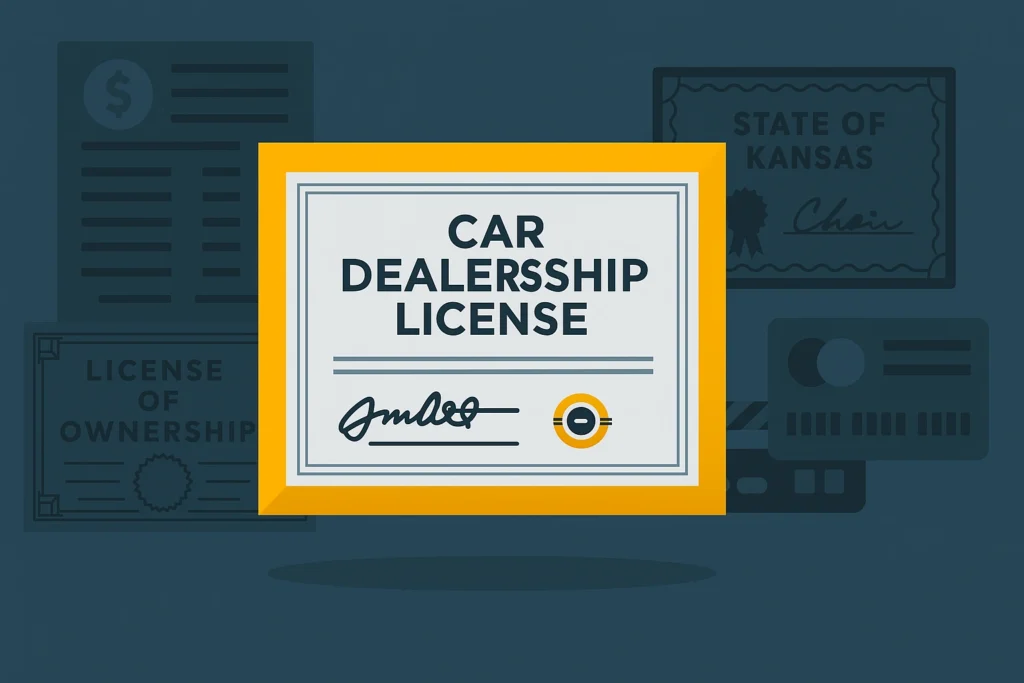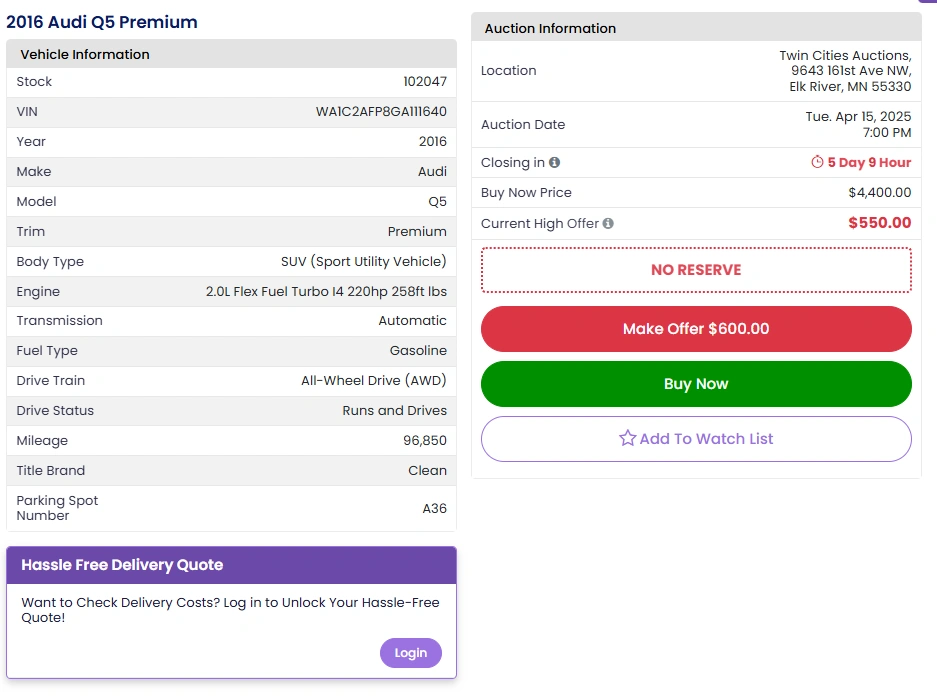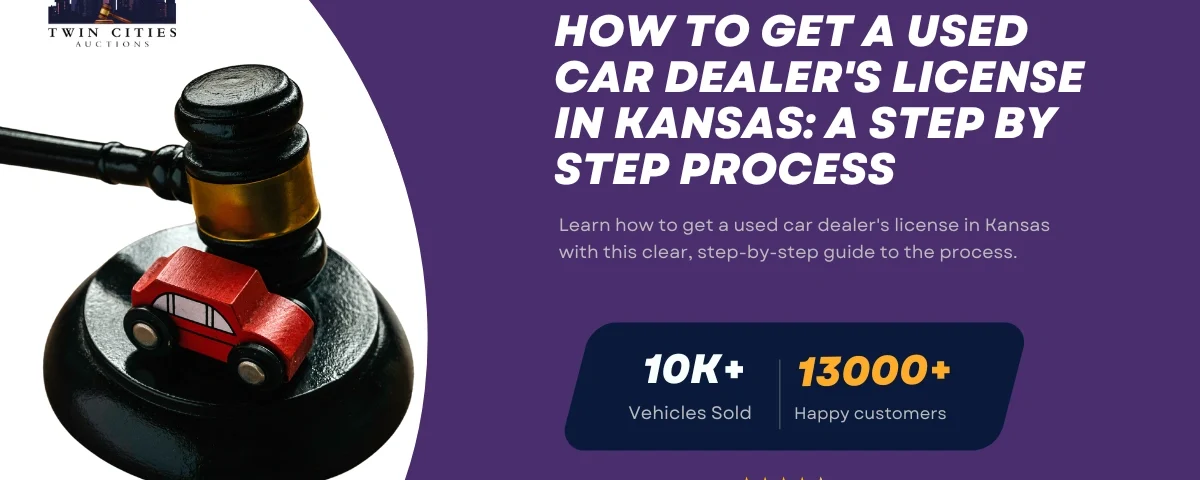If you’re considering starting your own used car dealership in Kansas, obtaining a used car dealer’s license is a critical step toward establishing a successful business.
Operating a dealership without a license can lead to fines, penalties, and even the closure of your business. Fortunately, the process of getting a used car dealer’s license in Kansas is manageable once you understand the steps involved.
In this blog, we will guide you through the entire process, explain key requirements, and highlight the benefits of sourcing inventory through auctions like Twin Cities Auctions.

Key Takeaways
- In Kansas, you can legally sell up to four vehicles per year without a license; selling more than that requires a used car dealer’s license.
- The application process involves business registration, meeting eligibility criteria, completing necessary education, and passing a dealership inspection.
- Auctions, like Twin Cities Auctions, offer a cost-effective way to source inventory with the benefit of competitive pricing and full transparency.
Step by Step Process: How to Get a Used Car Dealer’s License in Kansas
Step 1: Meet Eligibility Requirements
Before applying for your used car dealer’s license in Kansas, ensure that you meet the following eligibility requirements:
- Minimum Age: You must be at least 18 years old.
- Criminal Background: Kansas requires a criminal background check for all applicants. Felony convictions related to fraud, auto sales, or theft could disqualify you from obtaining a license.
- Physical Location: You must have a physical location for your dealership. This location must comply with Kansas zoning laws and be suitable for conducting business.
- Insurance: Proof of liability insurance is required. This protects both your business and your customers in case of accidents or other issues related to the vehicles you sell.
Step 2: Register Your Business
Once you meet the eligibility requirements, you need to register your business with the state of Kansas:
- Register with the Kansas Secretary of State: This is necessary to legally operate a business in Kansas.
- Obtain an EIN: You’ll need an Employer Identification Number (EIN) from the IRS for tax purposes.
- Apply for a Sales Tax Permit: Register with the Kansas Department of Revenue to collect sales tax on the vehicles you sell.
Step 3: Submit Your Application
After registering your business, the next step is to submit your application to the Kansas Department of Revenue (KDOR). The application will ask for the following details:
- Personal information (name, contact information, etc.)
- Business information (name, address, ownership structure)
- Proof of business registration with the Kansas Secretary of State.
- Proof of sales tax permit from the Kansas Department of Revenue.
You can access the official application form and guidelines on the KDOR website: Kansas Department of Revenue.
Step 4: Pay the Application Fee
The application process requires a non-refundable fee, typically ranging from $150 to $500 depending on the scope of your dealership.
The fee varies, so it’s important to check with the KDOR for the most accurate and up-to-date pricing.
Step 5: Complete the Dealer Education Course
Kansas law requires new used car dealers to complete a Dealer Education Course. The course covers essential topics such as:
- Kansas vehicle sales laws.
- Dealer responsibilities and consumer protection.
- Proper record-keeping and reporting.
The course typically lasts for 3 to 6 hours and can be completed online or in person. After completing the course, you will receive a certificate that must be submitted along with your application for licensing.
Step 6: Schedule an Inspection
Once your application has been processed and your dealer education course is complete, you will need to schedule an inspection of your dealership location.
This inspection ensures that your dealership complies with Kansas state regulations and local zoning laws.
The inspection will verify that your location is suitable for conducting business, has adequate facilities for selling cars, and complies with safety standards.
Step 7: Wait for Approval
After the inspection, the final step is to wait for your dealer’s license to be approved. The processing time typically takes 4 to 6 weeks.
Once approved, you will receive your license, and you’ll be able to legally buy and sell vehicles in Kansas.
Dealer Licensing Requirements in Kansas
Here’s a breakdown of the key licensing requirements for a used car dealer’s license in Kansas:
| Requirement | Details |
| Age | Must be 18 years or older |
| Business Location | Must have a physical location suitable for vehicle sales |
| Insurance | Proof of liability insurance is required |
| Background Check | Must pass a criminal background check |
| Dealer Education | Required completion of a 3-6 hour dealer education course |
| Application Fee | $150 – $500, depending on dealership type |
| Sales Tax Permit | Required for collecting sales tax |
| Sales Limit | Can sell up to 4 cars per year without a license |
Why Auctions Are a Smart Choice for Vehicle Sales
When you’re building your inventory, using auctions can be a smart choice for sourcing vehicles. Twin Cities Auctions, based in Minnesota, is one such reputable auction house that offers a wide range of vehicles at competitive prices.
Key Benefits of Buying from Auctions:
- Wide Selection: Auctions like Twin Cities Auctions offer a variety of vehicles, from low-budget cars to high-end models.

- Competitive Pricing: Auctions often offer vehicles at prices below retail value, enabling dealers to maximize their profit margins.

- Transparency: Auctions provide full vehicle history reports, so you know exactly what you’re buying.

- Convenient Bidding: Many auctions offer online bidding for your convenience, making it easier to source vehicles without being physically present.
Twin Cities Auctions: A Smart Vehicle Sourcing Choice
For those in the automotive industry, Twin Cities Auctions offers an excellent platform for sourcing quality vehicles at competitive prices.
Whether you are just starting or expanding your business, this auction house provides transparency, competitive pricing, and a broad selection.
| Feature | Description |
| Inventory Variety | Wide range of cars, trucks, and SUVs available |
| Competitive Pricing | Below-market pricing allows for higher profit margins |
| Vehicle History Reports | Detailed history reports for every vehicle |
| Online Bidding | Convenient online bidding options for dealers |
| Financing Options | Financing available to help with inventory purchases |
Practical Tips for Sellers and Dealers
Once you have obtained your used car dealer’s license, it’s important to stay compliant and build a strong business. Here are some practical tips to help you succeed:
- Stay Informed About Changes in Laws: Keep up to date with Kansas vehicle sales regulations and other laws that could affect your dealership.
- Keep Detailed Records: Kansas law requires you to maintain accurate records of every vehicle you sell, including information on the car’s history and condition.
- Provide Transparency to Customers: Transparency builds trust with your customers. Make sure you provide full vehicle histories and disclose any issues upfront.
Conclusion
Getting a used car dealer’s license in Kansas is a manageable process when you follow the steps and meet the necessary requirements.
From registering your business to completing a dealer education course and passing an inspection, each step is crucial in ensuring your dealership operates legally.
Don’t forget to consider sourcing your inventory through auctions like Twin Cities Auctions for great deals and a wide selection of vehicles to help grow your business.
Ready to Buy or Sell Your Car? No Dealer License Needed!
At Twin Cities Auctions, we simplify the process of buying and selling vehicles, making it straightforward and hassle-free. You don’t need a dealer license to participate—our online platform is open to the public, accommodating both first-time buyers and seasoned sellers.
Whether you’re upgrading your ride or selling your current vehicle, we provide the platform you need that offers a diverse range of vehicles and a transparent bidding process. Start your auction journey with us today!
Looking for more options? Explore our comprehensive list of all available car auctions across the United States. Your next deal might be just a click away!
FAQ
How many cars can I sell without a license in Kansas?
In Kansas, you can sell up to four vehicles per year without a license. However, selling more than four cars requires you to obtain a used car dealer’s license.
What documents are required when applying for a used car dealer’s license in Kansas?
You’ll need to provide proof of business registration, proof of insurance, a completed background check form, and a certificate of completion from the dealer education course.
How long does the application process take in Kansas?
The entire process typically takes around 4 to 6 weeks, from submission of your application to approval.
Do I need to take a dealer education course in Kansas?
Yes, you are required to complete a dealer education course in Kansas. The course covers state laws, dealer responsibilities, and consumer protection.
How much does it cost to obtain a used car dealer’s license in Kansas?
The application fee for a used car dealer’s license in Kansas ranges from $150 to $500 depending on the size of your dealership.
Can I sell cars online if I have a used car dealer’s license in Kansas?
Yes, once you have your used car dealer’s license in Kansas, you can sell cars online as long as you comply with state sales regulations.
What is the process for scheduling a dealership inspection in Kansas?
After submitting your application and completing the dealer education course, you will need to schedule an inspection with the Kansas Department of Revenue (KDOR). The inspection ensures your location complies with local zoning and business regulations.
Where can I find used cars for my dealership in Kansas?
Twin Cities Auctions is an excellent option for sourcing vehicles for resale, offering competitive pricing, a variety of cars, and financing options.


